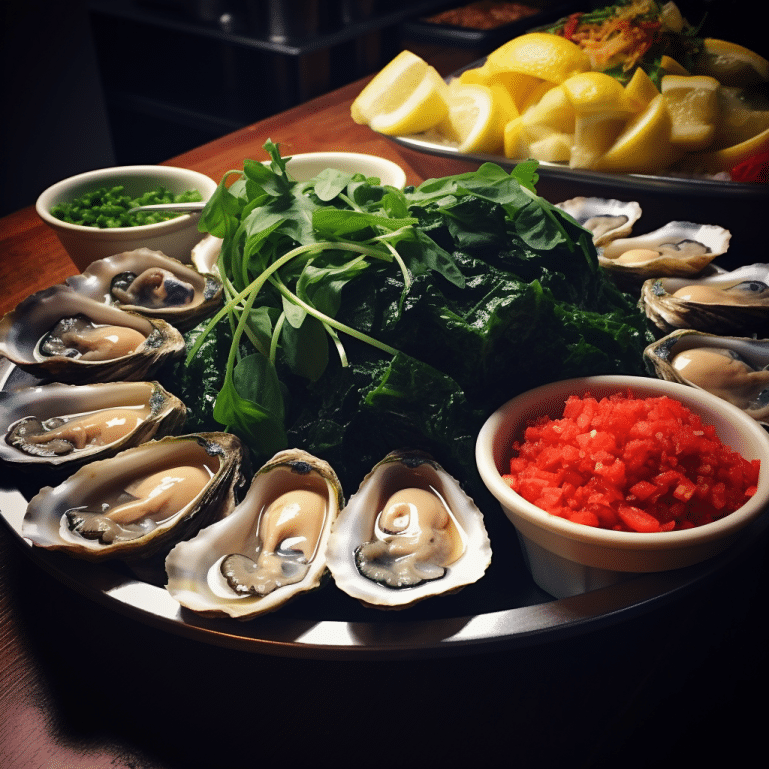Depression is a growing public health concern, but nutrition may offer a pathway for prevention and treatment.
A new research study identified the most nutrient-dense foods for brain health to inform dietary recommendations.
Key Facts:
- 12 nutrients have evidence supporting a role in preventing and treating depression, including omega-3s, B vitamins, minerals like magnesium, and antioxidants.
- The highest-scoring animal foods were bivalves like oysters, organ meats, and fatty fish.
- The highest plant sources were leafy greens, cruciferous vegetables, peppers, and herbs.
- Traditional whole foods patterns like Mediterranean diet outperform Western diet for depression risk.
- Nutrient-dense foods can be incorporated into any dietary pattern.
Source: World Journal of Psychiatry
Depression, Diet, & Specific Foods
Depression is the leading cause of disability worldwide, disproportionately affecting women and young adults.
The World Health Organization estimates over 300 million people globally suffer from this mental health condition.
Growing evidence shows diet quality impacts depression risk, with Western dietary patterns high in processed foods associated with higher incidence.
Conversely, traditional diets rich in fruits, vegetables, fish and whole grains correlate with lower rates of depression.
Diet may act through inflammation, oxidative stress, neurotransmitter synthesis, and the gut-brain axis.
Though the role of overall eating pattern is established, research is still needed on specific food sources.
Nutritional psychiatry aims to uncover dietary constituents beneficial for mental health.
Simply supplementing single nutrients shows inconsistent results.
However, whole food sources offer synergistic combinations of vitamins, minerals, antioxidants and prebiotics.
Determining the most nutrient-dense choices may help refine dietary recommendations for depression prevention and treatment.
Top 12 Antidepressant Nutrients (Study)
Researchers first conducted a literature review to identify nutrients with evidence related to depression, out of the 34 known essential human nutrients.
They searched major scientific databases for studies on each nutrient and depressive disorders or symptoms.
Both observational cohort studies and clinical trials were evaluated.
The level of evidence for each nutrient was graded based on the number and quality of studies.
Twelve nutrients met inclusion criteria, needing a combined score of 5 or less from observational and experimental study categories.
The resulting “Antidepressant Nutrients” were:
- Folate
- Iron
- Omega-3s EPA & DHA
- Magnesium
- Potassium
- Selenium
- Thiamine
- Vitamin A
- Vitamin B6
- Vitamin B12
- Vitamin C
- Zinc
These nutrients represent B vitamins, minerals, antioxidants and anti-inflammatory agents with evidence for depression risk reduction and symptom improvement.
Meeting intake recommendations may help ensure optimal mental health.
Many play roles in neurotransmitter production, inflammation modulation, oxidative stress and metabolic pathways related to depression.
Ranking Antidepressant Foods
With the Antidepressant Nutrients identified, the researchers next quantified nutrient density of various foods to determine the richest sources.
The USDA food database provided nutrient content per 100 grams for over 200 foods high in at least one target nutrient.
The nutrient density score for each food was calculated as the average percent daily value across the 12 Antidepressant Nutrients, capped at 100% to prevent skewing.
Nutrients without established daily values, like omega-3s, were calculated based on common recommendations.
The final Antidepressant Food Score represents the ratio of nutrient density to calories per serving.
Foods were separated into plant and animal categories to account for differences in bioavailability and composition.
The top-ranking Antidepressant Foods” were:
Animal Foods
- Oysters
- Organ meats like liver
- Clams, mussels & other bivalves
- Fatty fish like salmon & tuna
Plant Foods
- Leafy greens like spinach, kale & lettuce
- Cruciferous vegetables like broccoli & Brussels sprouts
- Fresh herbs like parsley, basil & cilantro
- Bell peppers & chili peppers
In general, seafood, organ meats, greens, herbs and brightly colored produce scored highest.
Categories like grains, dairy and nuts ranked lower.
This highlights the benefits of traditional whole food diets rich in plants and omega-3s.
Antidepressant Food Score: New Tool to Fight Depression with Diet
The Antidepressant Food Score provides a new tool to identify optimal food choices for depression prevention and treatment.
The analysis found cold-water fatty fish, organ meats, leafy greens, peppers and herbs contained the greatest density of beneficial nutrients like B vitamins, minerals, antioxidants and omega-3s.
These foods are not as commonly consumed in Western diets, which may partly explain higher depression rates. Incorporating more nutrient-dense choices may help reduce depression risk.
The foods can be integrated into any healthy dietary pattern like Mediterranean, DASH or Flexitarian.
Future studies can use these rankings to design dietary interventions, select supplements that match food sources, and make clinical recommendations.
Patients could add a few high-scoring foods daily. The analysis helps refine nutrition guidance beyond general healthy diet advice.
However, some limitations exist. Nutrient bioavailability differs substantially between plant and animal sources which may affect results.
The score also focuses on positive nutrients versus limiting saturated fat, sodium or cholesterol.
Additionally, high supplemental doses of single nutrients may not confer the same benefits as food sources due to synergies.
More research is needed on bioactive compounds like polyphenols and prebiotic fibers.
Conclusion: Diet May Help Treat Depression
Dietary pattern significantly influences depression risk, with traditional diets high in produce, seafood and whole grains associated with lower incidence.
This analysis identified the most nutrient-dense sources of nutrients with evidence related to depression among animal and plant foods.
Cold-water fatty fish, organ meats, leafy greens, peppers and herbs contained the highest density of omega-3s, B vitamins, minerals and antioxidants.
Incorporating more of these antioxidant, anti-inflammatory foods into dietary patterns may help prevent and treat depression.
The rankings can inform dietary guidance and intervention design.
Further research on additional bioactives like polyphenols is warranted.
In summary, optimizing intake of nutrient-dense whole foods may present a promising nutritional strategy for combating the growing burden of depression.
References
- Paper: Antidepressant foods: An evidence-based nutrient profiling system for depression (2018)
- Authors: Laura R LaChance & Drew Ramsey

